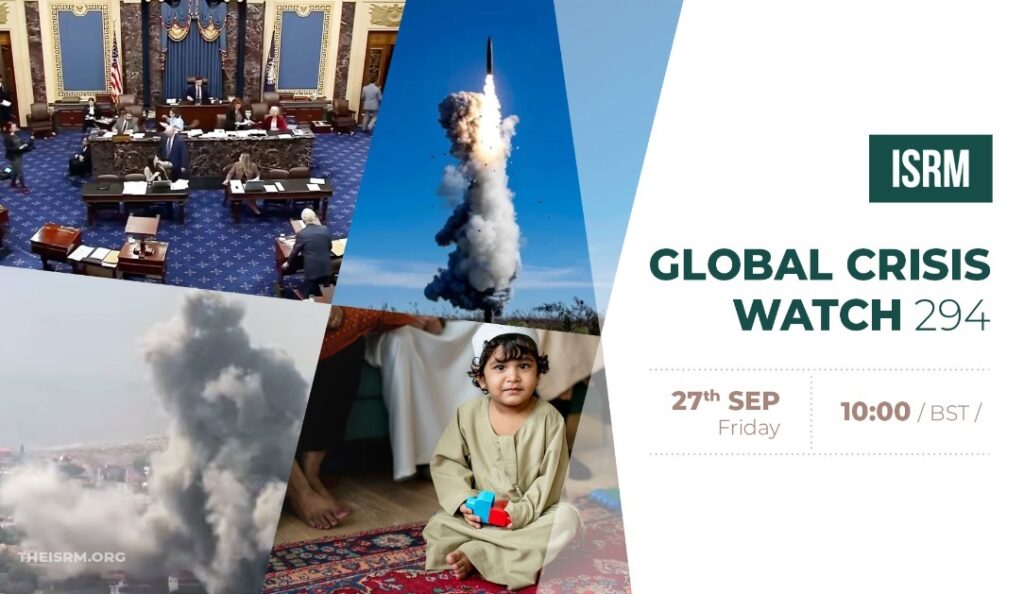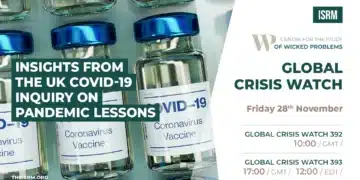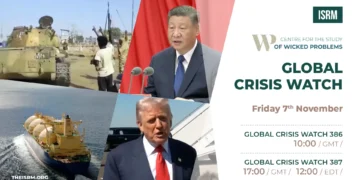The Institute of Strategic Risk Management (ISRM) is offering a recording of its Global Crisis Watch weekly webinar where the meeting revolved around global crises, cybersecurity, and the importance of effective leadership. This is a recording of its most recent meeting which took place Friday, September 27.
The participants discussed recent events such as China’s ICBM tests, the Taliban’s restrictions on women, and the rapid increase in Mpox cases in Australia. They also explored the need for proactive measures in education, the importance of retaining institutional knowledge in organizations, and the challenges faced by emergency services due to an aging workforce and increasing natural disasters.
Topics in details included:
China’s ICBM tests and Geopolitical implications
Ian expressed concerns about China’s recent ICBM tests and the situation in Afghanistan, particularly for women. Andrew agreed with Ian’s views on China’s patient strategy. Nishith discussed the geopolitical implications of China’s ICBM tests for Asian nations like India. He criticized politicians’ lack of statesmanship and short-term focus. Andrew cited Australia’s lack of statesmen. Chris raised concerns about China’s economic recovery impacting export-dependent countries like Australia and New Zealand.
Mpox, Pandemic Fund, and global economic challenges
Chris and Andrew discussed the rapid increase in Mpox cases in Australia and the potential for the virus to spread globally. They also touched on the Pandemic Fund and the economic challenges faced by Australia and New Zealand due to previous disasters and Covid-19. Andrew raised concerns about the influence of America on Israel and Ukraine, and the changing global landscape where countries are considering alternative alliances. He also highlighted the importance of the Indian Ocean region for Australia, its strengths in agriculture and mining, and the challenges posed by global events.
New team member’s thoughts and upcoming courses
Andrew initiated a discussion, inviting Kamal, a new member of the team, to share his thoughts. Kamal, a master’s student at the University of Portsmouth, shared his experiences and how his recent studies in risk, crisis, and resilience management have been an eye-opener. He also mentioned his background as a corporate security practitioner. Ian Betts shared that David, who was absent, had been involved in several events and gatherings, and they were planning to organize a series of courses in Thailand in Q2. Jim raised a question about Lebanon’s role in preventing Hezbollah and its implications under international law. Ian Fox briefly commented on the discussion.
Addressing conflict and diplomacy challenges
Ian Fox discussed the ongoing conflict in Lebanon, comparing it to his experiences in Northern Ireland, and emphasized the need for proactive measures in education to train individuals for emergencies. Nishith agreed with Ian’s points and added that he would explore these ideas further. Nishith also discussed the complexities of international diplomacy, the challenges of proving legitimate targets in cross-border actions, and the importance of effective diplomacy in projecting the correct narrative. Andrew then invited Kamal and Chris to provide their final comments.
Emergency preparedness, workforce challenges, and leadership
Chris, the President of the Australasian Institute of Emergency Services, stressed the importance of educating primary school children about emergency preparedness, noting its potential to reach a wider audience. He also discussed the challenges faced by emergency services due to an aging workforce and increasing natural disasters. Andrew agreed with Chris’s points and added his own observations about the Lebanese government’s struggle with Hezbollah and the social contract’s destruction due to a lack of leadership. He also highlighted the issue of young people not seeing volunteering as a viable path and the need for organizations to adapt to the changing world. Andrew concluded by expressing concern over the lack of confidence in politics and economics and the need for more balanced and sane leadership.
Shifting leadership models for the distributed world
Andrew led a discussion on the topic of leadership, emphasizing the need for a shift in leadership models to better suit the current distributed and asynchronous world. He highlighted the limitations of traditional leadership models, which often rely on outdated research, and suggested that leadership roles should be based on expertise rather than authority. Ian Fox shared his thoughts on the importance of leadership in the future, referencing his conversation with Gav Schreider about the need for new leadership models. Andrew also shared his personal experiences as a young junior officer, emphasizing the importance of trusting one’s gut instincts in decision-making. The conversation ended with a discussion on the concept of prestige leadership, where individuals are given leadership roles based on their expertise in specific areas.
Retaining institutional knowledge and organisational evolution
Ian Fox and Andrew discussed retaining institutional knowledge in organizations as employees depart quickly. They emphasized respecting long-tenured employees’ wisdom. Andrew shared an experience highlighting the value of tradition over a young employee’s doubts. Ian proposed a theory that organisations must evolve like animals adapting to new environments, which Nishith suggested could be a book idea. They also discussed transferring knowledge over short political and corporate tenures in Australia.
ZOOM Recording Link: video1693171964.mp4
For more ISRM news, click here





